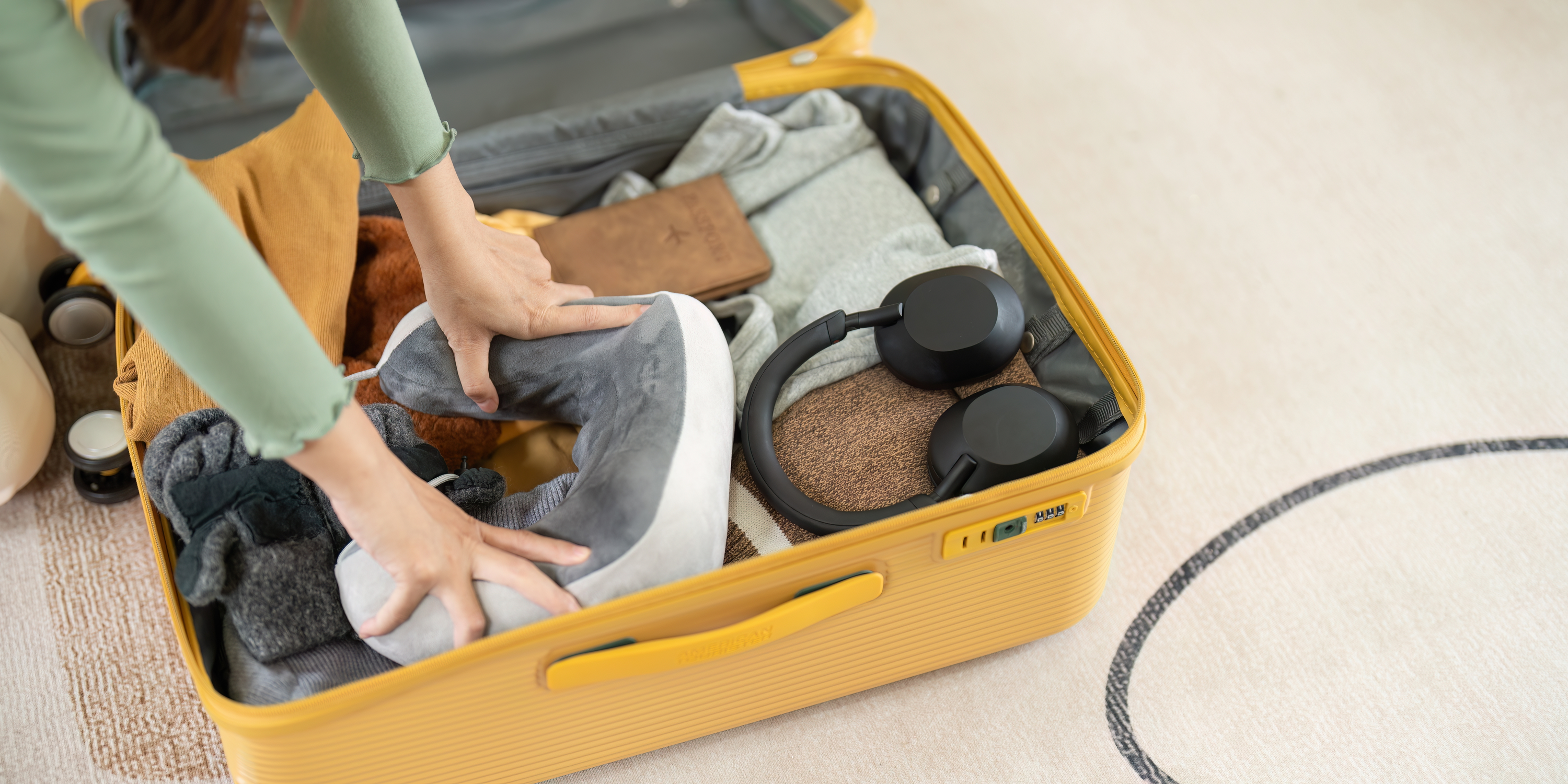
A step-by-step guide to starting university
Applying for university is a really exciting time, from deciding on the course you want to study to choosing the city you plan to call home. If this feels overwhelming, don’t worry – you’re not alone.
Whether you’re itching to get started or enjoying the calm before the (freshers) storm, there’s a lot to do. This guide will give you the lowdown on how to apply for university, what you need to do to prepare, and things to tick off your first-year university checklist.
In this guide we'll cover:

Choose where and what you want to study
Depending on what you want to study, courses can differ quite a lot between unis – so it’s important to do your research. Some organisations specialise in certain subjects and may have more advanced facilities – like state-of-the-art science labs or design studios.
You need to find the right balance. If your dream city doesn’t offer a course that inspires you, it may not be the right path. Ideally, you want to find a course you love in a city that inspires you and feels like your perfect match.
There are also practicalities to consider. Different cities will be more or less expensive than others. According to the NatWest Student Living Index, Belfast and Bath are two of the most affordable UK cities for students – complete with cobbled streets and cosy pubs. On the other end, both the cosmopolitan capital of London and buzzing Brighton are two of the most expensive student cities in the UK.
Once you’ve checked how your chosen city works with your budget, it’s a good idea to attend open days to make sure it feels right for you. When selecting your course, consider what you may want to do after university, and whether you can turn your hobbies or passions into a career.
Explore our Unite Students locations.
Key dates and entry requirements
It’s important to do your own research into the specific course and university you’re applying to, as each will have entry requirements and closing dates. Make sure you understand what each place requires before submitting your choices.
Depending on the course and institution, you may need to complete an entry exam or attend an interview to secure your spot.
If you’re applying to university, you’ll need to get to grips with the UCAS tariff. Essentially, it’s a way to compare qualifications by giving your grades a number. Some universities ask for specific grades in certain subjects, but others ask for an overall tariff.
For example, A-Level grades translate to:
A* = 56 UCAS points
A = 48 UCAS points
B = 40 UCAS points
C = 32 UCAS points
D = 24 UCAS points
E = 16 UCAS points

Start applying
The big step. While it may seem daunting, you’ll usually be able to find lots of support at your college or sixth form, and also online from UCAS itself.
You can apply for a maximum of five university courses initially. Once you get your offers back, you can submit two as firm choices, and two as insurance. Your firm choices are the unis and courses you really want to go to, if you get the grades. Your insurance options are the next best things – and usually have lower entry requirements as a backup.
You can usually start your UCAS application in the spring and send your application off from the beginning of September. Applications for courses at Oxford and Cambridge – as well as for medicine, dentistry and veterinary science courses elsewhere – often close in mid-October. These deadlines may change though, so you’ll need to double check beforehand.
The equal consideration date is mid-January. This means universities must equally consider all applications that have been received by this point. There is a final deadline at the end of June for courses that still have spots left. Applications after this are entered into clearing.
Find university clearing accommodation
How to fill in your UCAS application
The UCAS website is the main way you’ll apply for uni and manage your applications. When it’s time to get started applying, there are a few steps to follow:
Register for an account. You’ll need to register for a UCAS account in the UCAS Hub. You’ll also need to confirm the year you’d like to start your studies.
Enter your details. Next, complete all your personal details. Make sure your name matches what’s on your official ID.
Add your education history. You’ll be asked to enter information about any qualifications you have, from secondary education onwards.
Employment history. Add details of past or current employment. Any voluntary work can be added to your personal statement.
Select your choices. It’s time to add your UCAS options. At this stage, any order is fine – there’s no need to rank preferences just yet.
Write your personal statement. Feeling stuck? Learn how to write and structure your personal statement with the help of our experts.
Submit your application. Once you’re ready, check your answers and hit submit.
Get a reference and pay the fee. Finally, get your academic reference sorted and pay the UCAS fee. Congrats – you’ve done it!

Wait to receive your offers
Once your application has been sent, it can be a nerve-wracking wait – so it’s natural to feel anxious. If you applied through UCAS, universities will likely update your application on the platform directly, but some may contact you via email.
If you sent your application by the end of January, you’re likely to hear back in May.
If you sent your application by the end of June, you’re likely to hear back mid-July.
What are the different types of university offers?
The waiting is the hardest part. Once your chosen universities have made their decision, you’ll be sent one of the following offers:
Conditional. This is a good sign, but means you still need to meet some requirements to be accepted – like certain grades.
Unconditional. This means you already meet the requirements, and your place has been confirmed. Well done!
Contextual. This means a university is considering your application alongside additional context. For example, if you’ve been through any hardship that may have affected your education or results. It may include a reduced offer, an offer including a foundation year, an interview, an unconditional offer, or a course with additional support.
Unsuccessful and withdrawn. If you receive either of these, unfortunately, for one reason or another, you haven’t been accepted – or the university has withdrawn the choice.

Book your accommodation
Next is the fun part. Choosing your pad for the next few years. From student accommodation and uni halls to private rentals and living at home, there are a few different options to consider.
Student halls can be a super fun experience – living with fellow students can be a real party, and it’s handy not to have to argue over sorting your own bills. You’ll often pay a little more than for a private rental, but this is because accommodation often comes with plenty of extras, including:
24/7 security
All bills included
En-suites
Large social spaces and facilities like study rooms and cinemas
Closer proximity to university
Student support options
Ready to book? Learn more about our student accommodation options
Private housing can still be a good social experience – many cities have student hubs where lots of people choose to stay, so it’s still possible to feel a sense of community and make friends. You’ll also have more choice over the accommodation type, and you could even find a pad with a private garden.
Learn more about the differences between uni halls and private rentals.
Keep these points in mind when deciding on your uni accommodation:
How close to uni would you like to be?
Are you after a quiet location or a party spot?
Do you prefer an en-suite or are you not fussed?
How many people would you like to live with?
Do you want to meet new people or live with someone you know?
How to apply for Unite Students accommodation
Unite Students are the leading UK student accommodation provider – which means We offer plenty of locations and options to choose from. Like almost 64,000 rooms and a helpful team who can support with group bookings and even summer stays.
We believe that student accommodation should feel like your home, however long you’re with us, and we aim to give you space to thrive. Our halls include social spaces, study rooms, communal spots and other great facilities – from gyms and outdoor areas to cinema rooms and gaming zones.
Our exact accommodation choices differ based on the city you choose, and we have spots all across the UK from Aberdeen to Portsmouth. Prices vary depending on the location too.
Unite Students application process
Our rooms are released in November for the next academic year. You can apply at any time but, be warned – our rooms are allocated on a first-come-first-served basis! Here’s how to get started:
Choose your city and accommodation. Time to decide whether you’ll be living it up in Leeds or having a party in Portsmouth.
Pick your room type. Have a think about whether you’d prefer an ensuite or non-ensuite room. This is also the time to select an accessible space if required.
Book online. Sorting this all out online is the easiest way to do things, and you can track and manage your applications in one place. Simply head to the city you want to stay in, choose your accommodation and click ‘Reserve your room’.
Enter your personal and payment details. As it says on the tin – time to add all your details in.
Choose an instalment plan. You have the chance to select a preferred instalment plan for your accommodation payments – you may choose to stagger this according to your student finance arrangements.

Arrange your student finances
Arranging your finances is a key part of applying for university. But it can be hard to wrap your head around Student Finance. To start with, there are a few different options to understand:
Tuition fee loans. These cover course costs up to £9,535 a year. It’s used to cover lectures, seminars and other equipment you use at uni. It’s paid directly to the uni and you won’t need to pay these back until after your studies.
Maintenance loans. These loans are means-tested, which means that the amount you receive is based on your household income and what you’re studying. This loan is paid into your bank account, and you can spend as you like – usually on day-to-day expenses, food and rent. Make sure to set up a budget!
Grants and bursaries. There may be financial help available for certain subjects or situations. These often include bursaries for sport, specified subjects or academic achievements – which may be offered for academic excellence or to students from lower-income families. Remember, if you’re struggling to afford university, there are resources to help, whether through us, UCAS or your university.
For more money talk, have a read of our financial literacy for students blog.
Key Student Finance application dates
Student Finance applications usually open in March, so it’s a good idea to get things sorted as soon as you can. However, there are some application deadlines to be aware of when applying for funding:
For example, if your course starts between the 1 August and 31 December, you need to apply by the 31 May after your course has started.
If your course starts between 1 January and 31 March, you need to apply by 30 September after your course has started.
If your course starts between 1 April and 30 June, you need to apply by 31 December after your course has started.
If your course starts between 1 July and 31 July, you need to apply by 31 March after your course has started.
Of course, these are the final dates you can apply by – you’ll want to get your finances sorted as soon as possible, so you receive your money in your first term.

Time to pack!
Get ready to pack up your life. But what do you need for university?
From clothes and bedding to kitchen supplies – there are a lot of things you need for uni. Remember to check what’s already in your accommodation to avoid doubling up on supplies.
Here’s a list of our uni essentials to consider taking with you. This could form a starting point for your university checklist:
Kitchen utensils
Pots, pans and crockery
Clothes
Clothes horse
Bedding
Photos and pictures
Lamps and accent lighting
Plants and ornaments
Cushions and blankets
TV
Smartphone and charger
Speaker
Games consoles
Hair dryer, straighteners or curlers
Laptop
Headphones
Course supplies
Starting uni: Key dates to remember
We know we’ve covered a whole lot of information here, so we’ve rounded up the key dates to add in your calendar:
October. Application deadline for Oxford, Cambridge and specialist degrees, including medicine.
January. Application deadline for all universities and courses (besides Oxford and Cambridge, and selected degrees, including medicine)
February. Time to start looking for accommodation.
March. Student Finance applications open.
May-July. Exam season. UCAS results released.
August. A-Level results day. Good luck!
September. Move-in day. Freshers week. Courses start.
Frequently asked questions
When in year 13 do you apply for university?
You usually apply for uni in the first term of year 13. But your school or college should be able to advise you! Remember that the dates vary depending on the uni and course, so Oxford and Cambridge – and medicine, dentistry and veterinary courses – close mid-October. For most, the deadline is in January.
Can you apply directly to a university?
While most universities use UCAS for undergrad applications, some may accept direct applications – but make sure you check first via the admissions team. This is more likely the case if you’re applying through clearing.
How much does UCAS cost?
In 2025, the UCAS fee is £28.50 for your five university choices. This fee covers the cost of submitting your application and general use of the UCAS system.
